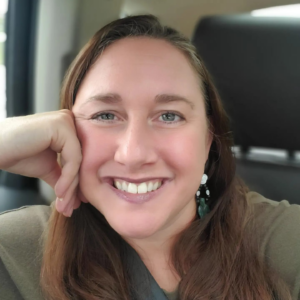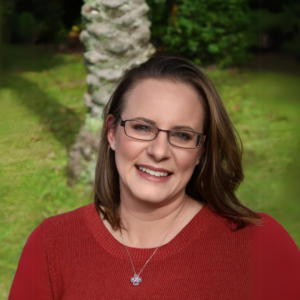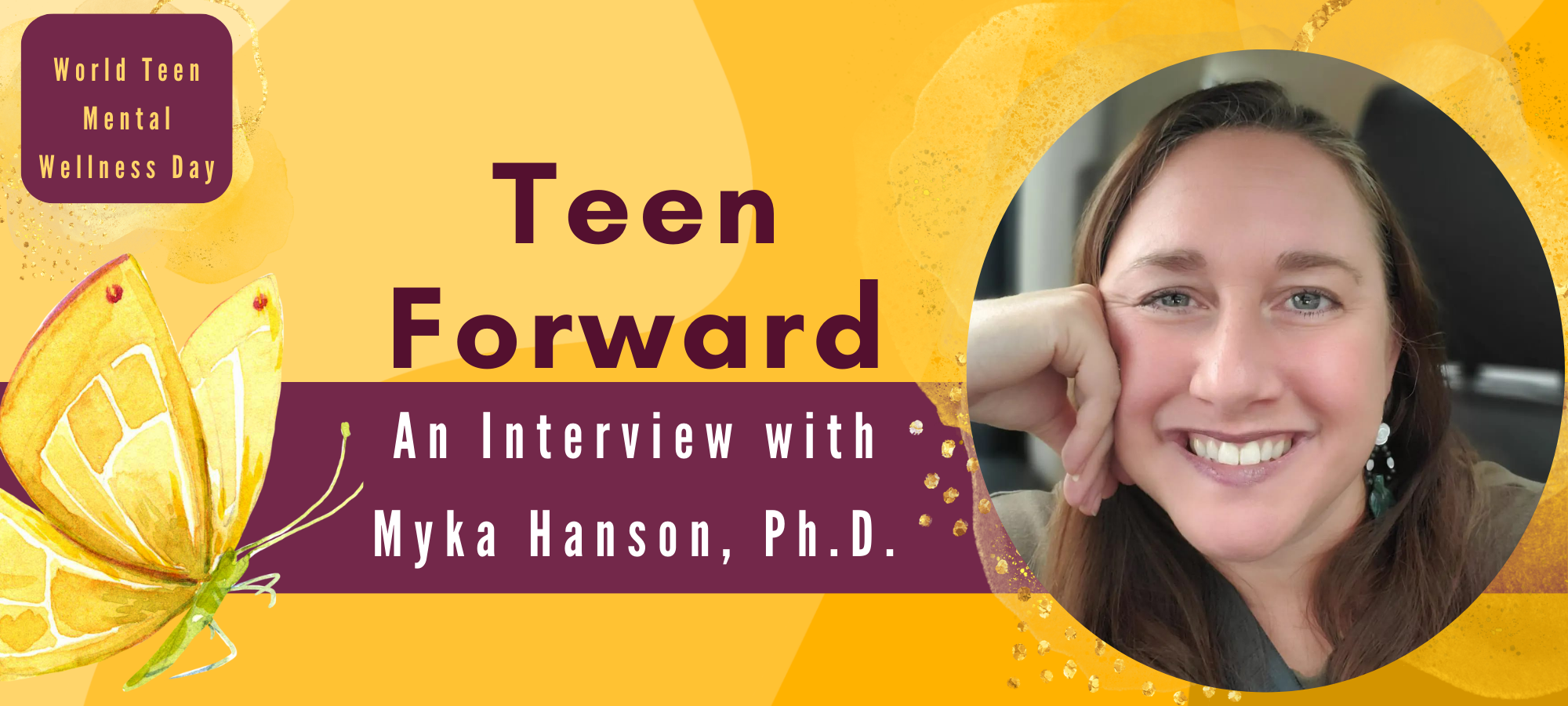By Krystyna Knight
As part of Pacifica Graduate Institute’s observance of World Teen Mental Wellness Day, I am delighted to be speaking with Dr. Myka Hanson, a PGI alumni who is the founder of Teen Forward.
Krystyna Knight: Can you share a bit about your journey from being a student at Pacifica Graduate Institute to working with teens in the field of mental wellness?
Myka Hanson: Of course! I began in the Depth Psychology and Somatic Studies Ph.D. program in 2016. I was living in Santa Barbara and was fresh out of an eating disorder treatment program for anorexia. As a part of my recovery, I had quit my 15+ year career as a high school teacher. I found my time at Pacifica to be both educational and incredibly healing. When I began to write my dissertation in 2019, I had moved back to Minnesota to get married and join my husband and two stepdaughters. When the pandemic closed schools in 2020, I knew it was going to be a deep wound that the world would be facing together. Through working with my dreams, archetypal council, and internal somatic work, I realized that the pandemic was a call to me to begin my work with teens from a place of my own grounded healing. I opened Teen Forward as a resource to teens and parents to begin to celebrate adolescence as an incredibly beautiful time in a person’s life, not a time that needs to be dreaded and struggled through.
Krystyna: What inspired you to specialize in working with teenagers specifically?
Myka: I love teenagers. They’re old enough to be able to communicate their opinions, desires, and frustrations, and young enough to still be goofy as well as highly creative and imaginative. They are hilarious, wise, potent balls of energy who are going to be running our world someday. I’ve found that teens want more than anything to have someone guide them on their own path–where they get feisty is when someone tries to direct them onto a path inauthentic to who they are. Parents do the best they can, but, as the African proverb says, “it takes a village to raise a child.” I’m honored to be included in so many villages.
Krystyna: Teenage years are often tumultuous and challenging. What are some common mental health issues you encounter among the teens you work with?
Myka: Anxiety is the biggest issue right now, and it’s for good reason; we are living in an anxious age. And, while feelings of anxiety are a natural way for our brain and nervous system to survive in the world, we have pathologized (calling in James Hillman) anxiety to a frightening point. This has created additional issues like depression, eating disorders, and substance abuse. Teens are seeking more extreme ways to deal with feelings of distress, anxiety, and chaos, and it’s coming at an extremely high cost. In 2021, more than 1.7 million people in the United States attempted suicide, according to the American Foundation for the Prevention of Suicide. There’s a lot of talk in the media about the “mental health crisis” facing young people today, and I see the truth of that every day in my clients and their families.
Krystyna: How do you approach building trust and rapport with the teens you work with?
Myka: I do two main things. First, I let them know up front that they are in charge of our sessions, and, second, I open my ears and listen to them. Teenagers are in a very discombobulated position of being expected to grow up (whatever that means) and become independent, but also listen, follow directions, and perform under the close observations of others, all without a fully developed brain!
When I put teens in charge of their sessions with me, I do so by telling them that I’m going to ask them questions that might seem sensitive or personal, and they always have the right to say, with no consequence, that they don’t want to answer the question. They often test me on that point, and when they find out I’m telling the truth, their nervous systems relax–sometimes I can see it! And their defenses crumble.
I have the privileged position of being able to listen to my clients without an agenda, without judgment, and without correction. This automatically makes me a very different set of ears than, say, a parent or teacher. I am able to help coach my clients to say their thoughts, perhaps clumsily at first, and learn to stand confidently in their beliefs and identity so they can communicate their needs and desires to others in their lives.
Krystyna: What are some effective strategies or techniques you utilize to support teenagers in managing their mental health and emotional well-being?
Myka: My favorite techniques are those that teens can use when they are sitting in the middle of a class, standing in a circle with their friends in the hallway, or even sitting on the sidelines of a sporting event. Teens need to balance their nervous systems and deal with anxious thoughts just like adults do, except most don’t have private spaces where they can do breathwork or other restorative techniques. For anxiety, I recommend box breathing and 5-4-3-2-1. For general emotional well-being, I recommend the “I am” mantra.
Box Breathing: This breath technique can be done anywhere. I love to recommend kids do this when they are sitting at an exam and realize they can’t think. Inhale to a count of four, hold the breath to a count of four, exhale to a count of four, and hold the exhale to a count of four. Then, begin again with the inhale. Repeating the cycle 4-5 times or as long as needed can be a game changer for anxiety!
The 5-4-3-2-1 method brings in the senses. Think of 5 things you can see, 4 things you can hear, 3 things you can smell, 2 things you can touch, and 1 thing you can taste. This method helps anxious thoughts, dissociation, and panic by grounding the teen in the present moment.
Finally, the “I am” mantra is a favorite activity of my teen clients. Together, we create a list of statements all beginning with the phrase, “I am.” I am creative. I am kind. I am imaginative. The teen picks three statements to use as an “I am” mantra. During times of uncertainty, panic, or confusion, the teen can repeat those three statements to themselves. I am creative. I am kind. I am imaginative. It’s a way for the teen to realize that, yes, they are anxious, but they are also so much more.
Krystyna: In your experience, what role do factors like social media, peer pressure, and family dynamics play in influencing teen mental wellness?
Myka: Social media is a huge concern the world over right now, as evidenced by the recent judicial senate hearing where the CEOs of Meta, Twitter, TikTok and others were brought before the committee to discuss the predatory nature of their products. Some people might say “well, parents just need to ban social media on their kids’ phones!” But it’s not that simple. Taking away social media from a teen is, today, the equivalent of putting them in solitary confinement. It keeps them from socializing and knowing what’s going on in their world. It can have a detrimental effect on a teen’s self esteem. Of course, social media itself has been proven to have a detrimental effect as well! So, we’ve put parents into a really hard spot. This goes hand-in-hand with peer pressure and parent dynamics. I believe parents always try to do what they believe is the healthiest, best thing for their teen to thrive in the world. The trouble is, we live in an ever-changing, constantly evolving and devolving world.
Krystyna: How do you incorporate elements of depth psychology into your work with teens, if at all?
Myka: Elements of depth psychology impact everything I do with teens, as I live my life from a depth psychological place. One of the more beautiful parts of my work with teens is that teens are also extremely depth psychological by nature. Teens tend to be deep thinkers, and it’s navigating these depths that takes a lot of daily energy. The shadow is extremely present in adolescence, and teens can be very drawn to its energy.
I rely heavily on James Hillman’s work with re-visioning, and I use aspects of image and archetype to inform the work I do with teens. Parents wonder how I can get kids to talk to me; I use the collective unconscious to find common ground. Parents think I’m magic, teens feel companioned, and I get to live into my soul’s work. It’s a win-win-win.
Dr. Stephen Aizenstat’s Dream Tending method works extremely well with one of my clients, and she has a beautiful, well-populated council of imaginal figures. When her mom texted me once to tell me she was concerned about her daughter not having anyone to sit with at lunch, I asked my teen client about it. She said that she had been lonely at first and felt like everyone was staring at her. Then, after a session where we brought in her dream council, she realized that she was craving time with her council during the school day. She uses her lunch time to eat, check in with her figures, and set an intention for the second half of her day.
Krystyna: Can you share a success story or memorable experience from your work with a teenager that highlights the impact of mental wellness support?
Myka: I have many success stories, and I’d love to share one that happened recently. I have worked with a client for almost a year. He is a college student in his second year at a US university. When I met him, he suffered from depression, anxiety, and feelings of terrible self-worth. He was a long way from home–his family lives six states away–and he was very lonely. More than once, his mom and I needed to tag team phone calls and texts with him to make sure that he stayed alive–literally. There were times when, in spite of amazing parent support, his therapist, and his work with me, he said he didn’t know if he was going to make it through.
Today, he is thriving. He transferred to a different school closer to home, and he is getting himself mentally healthy. He said to me a few sessions ago, “I wouldn’t be alive if it wasn’t for you.” He cried as he said this, and I could feel his relief, coming across as gratitude, was palpable. How terrifying it is for our teens to reach the end of their rope and feel they have no alternative but to drop. This young man began to climb back up, and he has so much ahead of him to live into.
Krystyna: What advice would you give to parents or caregivers who are concerned about the mental health of their teenage children?
Myka: Trust your instincts. Have a plan today to get your teen help if they were to become suicidal or become anxious or depressed. You may never need to use it, but you don’t want to need a plan and not have one. As frightening as it is to consider, your teen’s mental health is literally life-or-death. More than 6,500 people ages 10-24 die by suicide each year. But, there are resources out there so you don’t have to handle things alone.
There is still far too much shame surrounding mental health, particularly with anxiety and depression. Be the loudest, strongest, most powerful ally your teen has in their corner. Even if you worry you might be judged, even if you worry your teen will be mad at you. And, if you’re not sure who to ask for help, you can email me. I’ll help find at least a preliminary step to get your going in the right direction.
Krystyna: As we observe World Teen Mental Wellness Day, what message would you like to convey to teenagers around the world about prioritizing their mental well-being?
Myka: The biggest message I want teens to know is this: You live in a world that, right now, is not designed for your mental well-being. The anxiety, confusion, and chaos you feel is not coming from you; it’s not your fault, and it’s not a defect in your brain. You are perfect, whole, imaginative, and wonderful just as you are in this moment. You live in an imperfect world with a LOT of issues.
The most dangerous thing we do to our teenagers the world over is allow them to think that anything happening in their mental world is their fault. I will go to my grave (hopefully a long time from now!) reminding teenagers every day that they are extraordinary beings experiencing an extraordinary time in their development. They are sacred, energetic beings that have so much to learn and so much to teach. We as the adults in their lives owe them a better future than their current present.

As a high school English teacher for more than fifteen years, Myka worked with every type of student from those who were identified as at-risk, gifted and talented, and everywhere in between. Her classroom philosophy was to be the hour of the day where teens felt accepted, allowed to be themselves, and safe. She has carried that philosophy into founding Teen Forward and believes that adolescence does not need to be a struggle but can be an ultimately enjoyable experience remembered fondly as an adult.
Myka holds a bachelor’s degree in English/secondary education from St. Olaf College in Minnesota, master’s degrees in special education (University of Minnesota) and depth psychology (Pacifica Graduate Institute), and a Ph.D. in depth psychology and somatic studies from Pacifica Graduate Institute.

Krystyna Knight is the Interim Director of Marketing at Pacifica Graduate Institute and brings over a decade of experience to her role. As a military spouse, she skillfully balances family, career, and personal growth. Alongside her professional duties, Krystyna is dedicated to her role as a mother to two daughters and actively supports her local homeschooling community.


